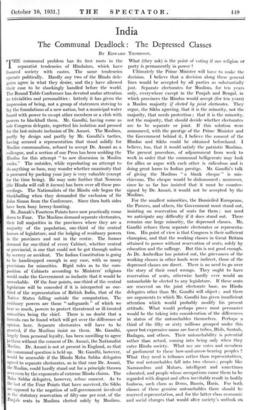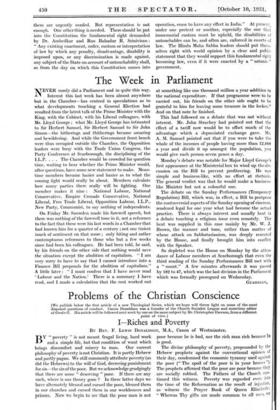India
The Communal Deadlock : The Depressed Classes
BY EDWARD THOMPSON.
THE communal problem has its first roots in the separatist tendencies of Hinduism, which have fissured society with castes. The same tendencies operate politically. Hardly any two of the Hindu dele- gates agree in what they desire, and they have allowed their case to be shockingly handled before the world. The Round Table Conference has devoted undue attention to trivialities and personalities : latterly it has given the impression of being, not a group of statesmen striving to lay the foundations of a new nation, but a municipal water board with power to co-opt other members or a club with powers to blackball them. Mr. Gandhi, having come as sole Congress delegate, regretted his isolation and pressed for the last-minute inclusion of Dr. Ansari. The Muslims, partly by design and partly by Mr. Gandhi's tactics, having secured a representation that stood solidly for Muslim communalism, refused to accept Dr. Ansari as a colleague, and a section of our Press has been scolding the Hindus for this attempt " to sow dissension in Muslim ranks." The outsider, while reprobating an attempt to do anything so base, may wonder whether unanimity that is procured by packing your jury is very valuable (except for the time being). He may note further that Nemesis (the Hindu will call it karma) has been over all these pro- ceedings. The Nationalists of the Hindu side began the blackballing when they demanded the exclusion of Sir John Simon from the Conference. Since then both sides have been busy heresy-hunting.
Mr. Jinnah's Fourteen. Points have now practically come down to Four. The Muslims demand separate electorates, their full majorities in the provinces where they are a majority of the population, one-third of the central houses of legislature, and the lodging of residuary powers in the provinces and not in the centre. The former demand for one-third of every Cabinet, whether central or provincial, is one that could not be got through unless by secrecy or accident. The Indian Constitution is going to be handicapped enough in any case, with so many provisions for minorities. Rigid rules as to the com- position of Cabinets according to Ministers' religions would make the Government so inelastic that it would be unworkable. Of the four points, one-third of the central legislature will be conceded if it is interpreted as one- third of the representation of British India, that of the Native States falling outside the computation. The residuary powers are those " safeguards " of which we hear so much, powers to protect threatened or ill-treated minorities being the chief. There is no doubt that a formula can be found which will get over the difference of opinion here. Separate electorates will have to be granted, if the Muslims insist on them. Mr. Gandhi, largely from personal loyalty, has been unwilling to agree to them without the consent of Dr. Ansari, the Nationalist Muslim. Dr. Ansari is not at present in England, so that the communal question is held up. Mr. Gandhi, however, would be amenable if the Hindu Maha Sabha delegates agreed to separate electorates, as in that case Dr. Ansari,. the Muslim, could hardly stand out for a principle thrown Over even by the exponents of extreme Hindu claims. The Malia Sabha delegates, however, refuse consent. As to the last of the Four Points that have survived, the Sikhs are opposed to the negation of self-government involved in the statutory reservation of fifty-one per cent. of the l'uniab seats to Muslims elected solely by Muslims. What (they ask) is the point of voting if one religion or party is permanently in power ?
Ultimately the Prime Minister will have to make the decision. I believe that a decision along these general lines would be accepted by all parties as substantially just. Separate electorates for Muslims, for ten years only, everywhere except in the Punjab and Bengal, in which provinces the Hindus would accept (for ten years) a Muslim majority if elected by joint electorates. They argue, the Sikhs agreeing, that it is the minority, not the majority, that needs protection ; that it is the minority, not the majority, that should decide whether electorates are to be separate or joint. If this solution were announced, with the prestige of the Prime Minister and the Government behind it, I believe the consent of the Hindus and Sikhs could be obtained beforehand. I believe, too, that it would satisfy the patriotic Muslims. The present procedure, of adjournment from week to week in order that the communal belligerents may look for allies or argue with each other is ridiculous • and is doing great harm to Indian prestige. Mr. Gandhi's talk of giving the Muslims " a blank cheque " is mis- chievous. The cheque would be dishonoured ; moreover, since lie so far has insisted that it must be counter- signed by Dr. Ansari, it would not be accepted by the Muslims.
For the smallest minorities, the Domiciled Europeans, the Parsees, and others, the Government must stand out, insisting on reservation of seats for them ; nor need we anticipate any difficulty if it does stand out. There remains one large minority, the depressed classes. Mr. Gandhi refuses them separate electorates or representa- tion. His point of view is that Congress is their sufficient champion, and that the working classes in Great Britain attained to power without reservation of seats, solely by education and the suffrage. But this is not good enough. As Dr. Ambedkar has pointed out, the grievances of the working classes in other lands were indirect, those of the depressed classes are direct. There is no need to go over the story of their cruel wrongs. They ought to have reservation of seats, otherwise hardly ever would an untouchable be elected to any legislature. If these seats are reserved on the joint electorate base, no Hindu delegates other than Mr. Gandhi will object ; and there are arguments to which Mr. Gandhi has given insufficient attention which would probably modify his present attitude. What would perhaps prove most persuasive would be the taking into consideration of the differences in status of the untouchables themselves. Perhaps a third of the fifty or sixty millions grouped under this queer but expressive name are forest tribes, Bhils, Santals, Badagas, and others. Their untouchability is potential rather than actual, coming into being only when they enter Hindu society. What use are votes and members of parliament to these bow-and-arrow-bearing peoples ? What they need is tribunes rather than representatives, The real untouchables fall into two classes ; people like Namasudras and Mahars, intelligent and sometimes educated, and people whose occupations cause them to be regarded with disgust and often inevitably result in bodily foulness, such clans as Doms, Bauris, Haris. For both classes of these genuine untouchables there should be reserved representation, and for the latter class economic and social changes that would alter society's outlook on them are urgently needed. But representation is not enough. One other thing is needed. There should be. put into the Constitution the fundamental right demanded by Dr. Ambedkar and Rao Bahadur R. Srinivisan : " Any existing enactment, order, custom or interpretation of law by which any penalty, disadvantage, disability is imposed upon, or any discrimination is made against, any subject of the State on account of untouchability shall, as from the day on which this Constitution comes into operation, cease to have any effect in India." At present under one pretext or another, especially the one that immemorial custom must be upheld, the disabilities of untouchables can be, and often are, enforced in courts of law. The Hindu Maha Sabha leaders should put them- selves right with world opinion by a, clear and public statement that they would support this fundamental right becoming law, even if it were enacted by a " satanic " government.



















































 Previous page
Previous page